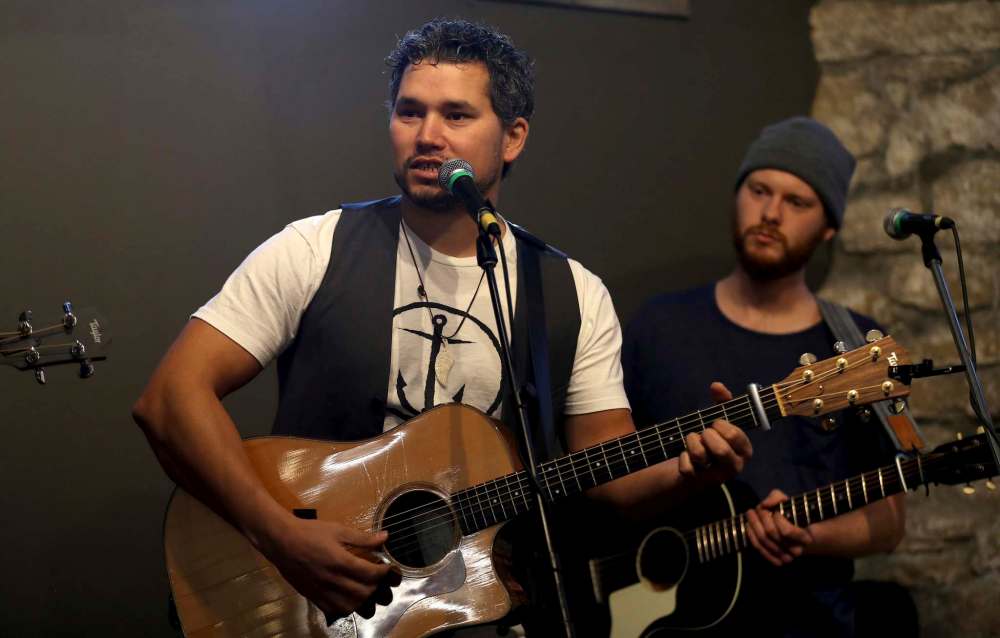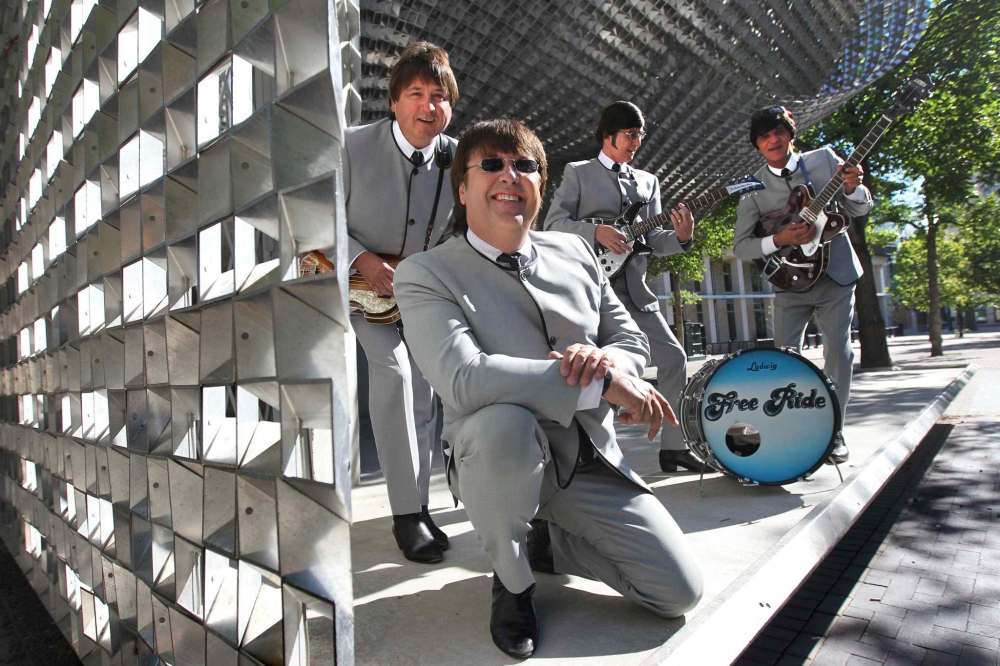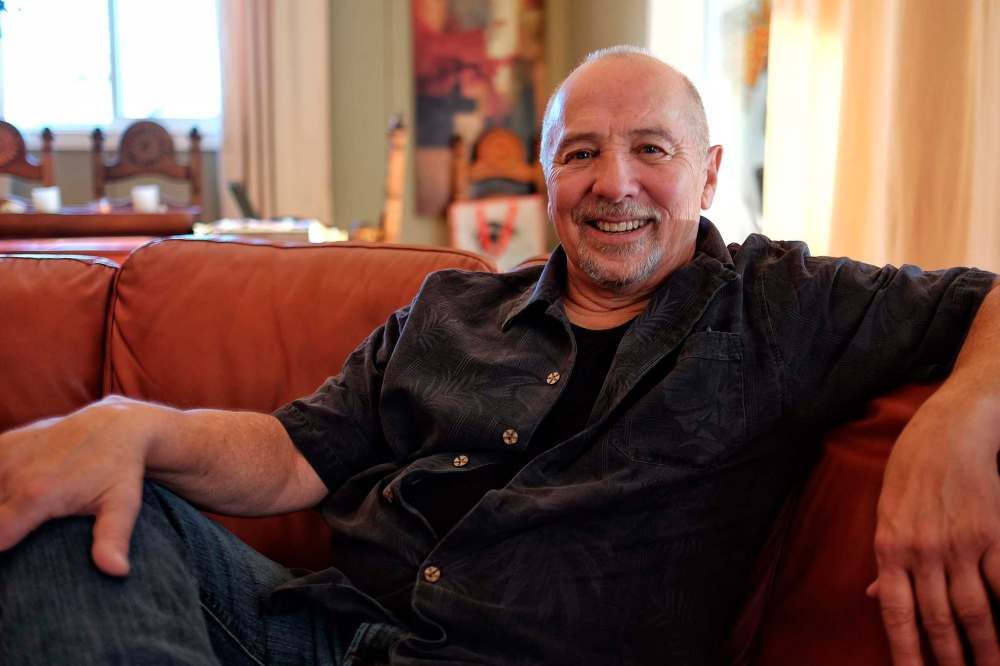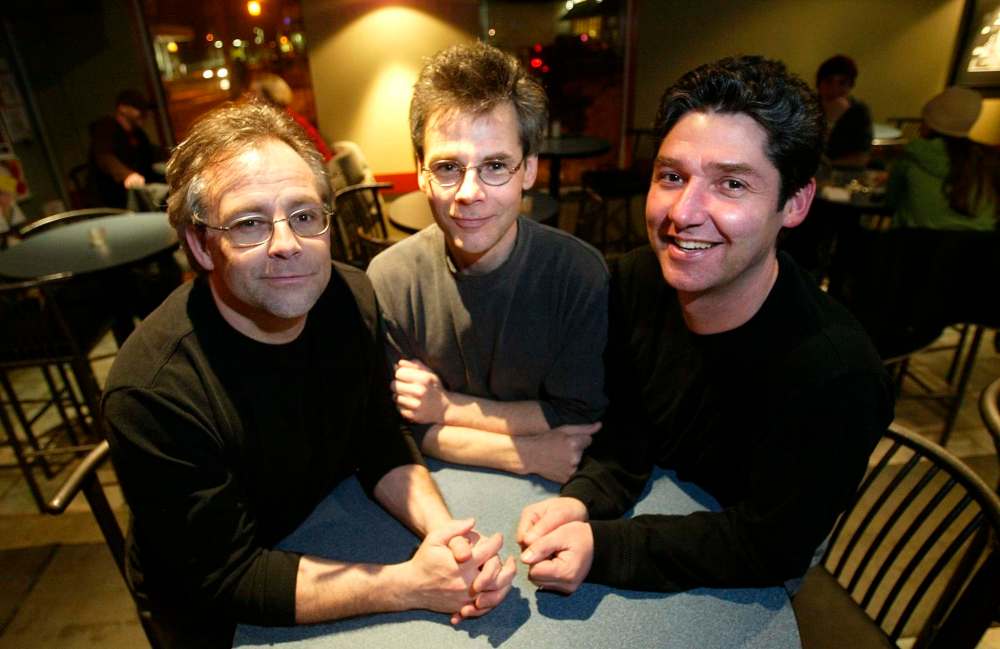In the key of F# A complex melody, a difficult passage, a bewildering rhythm: Winnipeg performers on the songs that gave them the blues
Read this article for free:
or
Already have an account? Log in here »
To continue reading, please subscribe:
Monthly Digital Subscription
$0 for the first 4 weeks*
- Enjoy unlimited reading on winnipegfreepress.com
- Read the E-Edition, our digital replica newspaper
- Access News Break, our award-winning app
- Play interactive puzzles
*No charge for 4 weeks then price increases to the regular rate of $19.00 plus GST every four weeks. Offer available to new and qualified returning subscribers only. Cancel any time.
Monthly Digital Subscription
$4.75/week*
- Enjoy unlimited reading on winnipegfreepress.com
- Read the E-Edition, our digital replica newspaper
- Access News Break, our award-winning app
- Play interactive puzzles
*Billed as $19 plus GST every four weeks. Cancel any time.
To continue reading, please subscribe:
Add Free Press access to your Brandon Sun subscription for only an additional
$1 for the first 4 weeks*
*Your next subscription payment will increase by $1.00 and you will be charged $16.99 plus GST for four weeks. After four weeks, your payment will increase to $23.99 plus GST every four weeks.
Read unlimited articles for free today:
or
Already have an account? Log in here »
Hey there, time traveller!
This article was published 23/02/2019 (2484 days ago), so information in it may no longer be current.
On the eve of the 100th anniversary of the Winnipeg Music Festival, which runs from Feb. 25 to March 17, Stacey Nattrass, winner of the annual competition’s Ladies Orange Benevolent Association Trophy in 1991 and Herbert and Audrey Belyea Trophy in 1999, is trying to recall which Austrian-born composer used to give her the most grief.

“I performed at the music festival every year from age 13 to 23, and the hardest piece I learned was either by Mozart or Haydn,” says Nattrass, a high school choir director perhaps best known for belting out the Canadian and American national anthems at Bell MTS Place prior to Winnipeg Jets home games.
“If I remember correctly, I think I sang an especially tough Haydn aria once; lots of fast notes in runs and not a lot of opportunity to breathe.”
Listen along
Listen to our Spotify playlist to hear the songs that made Winnipeg musicians suffer — or click on the songs in each section below to hear a 30-second sample.
Listen to our Spotify playlist to hear the songs that made Winnipeg musicians suffer (except for Nicky Mehta’s selection, which is not available on the streaming service — or anywhere else we looked!) Not a Spotify user? You can also click on the songs in each section of the story to hear a 30-second sample.
Nattrass says the festival, which began life in May 1919 as the Winnipeg Musical Competition Festival, was instrumental in preparing her for a successful music career now entering its fourth decade.
For example, when the married mother of three performed Steve Reich’s Tehillim at the Winnipeg New Music Festival in 2014 accompanied by the Winnipeg Symphony Orchestra, she spent “many, many hours” perfecting it; no different, she concedes, than the approach she used to take with whatever number she had chosen to sing at the Winnipeg Music Festival, years ago.
“I would say Tehillim is the hardest technical piece I ever learned — but probably the toughest to memorize was when I played the narrator in Rainbow Stage’s production of Joseph and the Amazing Technicolor Dreamcoat and had to remember the order of the colours in the title song.
"There were 28 in total — ‘It was red and yellow and green and brown…’ — so yeah, that was a difficult one, too,” she says, laughing and remarking, “oh, for sure,” when a scribe opines as demanding as that might have been (seriously, who wears a garment tinted fawn, azure and peach?), it must have helped knowing 15,000 rabid hockey fans weren’t going to suddenly rise to their feet in the middle of her performance and scream “True North!” at the top of their lungs.
In a nod to the thousands of musicians who will spend the coming days holed up in bedrooms and rehearsal halls across the city and province, fine-tuning every last note or lyric they’ll be presenting at the 101st Winnipeg Music Festival, we hit the streets, asking musicians of all stripes if there is one song or piece of music that stands out as having been particularly painstaking to master, from any juncture in their career.
♪ ♫ ♪ ♫ ♪
♪ ♫ ♪ ♫ ♪
Kevin Mears is the lead singer of Monuments Galore, a Winnipeg pop-punk outfit that got its start in 1982. Mears, a Dakota Collegiate alumnus, recalls how difficult it was to learn the words — close to 600 in total — to It’s the End of the World as We Know It (And I Feel Fine), which first appeared on R.E.M.’s 1987 release Document.

“It took more than a couple rehearsals to get this baby down pat and when we played it live, I had four or five pages of lyrics printed out — big pages, 11 (inches) by 17 (inches) — to help me remember all the words.
"Two funny things: when we first performed It’s the End of the World… at a U of M nooner, most people weren’t familiar with it yet and thought, ‘Wow, that might be a hit for Monuments Galore.’
"Second, when it gets to the part in the song when (R.E.M. lead singer Michael Stipe) sings, ‘Mountains sit in a line, Leonard Bernstein…’ I thought he was singing ‘laying Leonard Bernstein,’ but would often substitute ‘laying Howard Mandshein,’ instead, just cause I could.”
♪ ♫ ♪ ♫ ♪
Singer/songwriter Keri Latimer, known for her solo work as well as turns with alt-country bands Nathan and Leaf Rapids, admits she “just about had a nervous breakdown” learning to play Mesopotamia, by Turkish composer Fazil Say, on the theremin, an electronic musical instrument, for a performance at the 2017 Winnipeg New Music Festival.

“Mesopotamia is a beautifully intense and epic piece that features the theremin, an instrument you don’t touch to play. You wave your hands in mid-air and rely on your ears, muscle memory and blind faith to make melodies.
"I received the score a couple of months before the performance, and for a folk/roots musician who lives primarily in the 4/4 world, it moved swiftly through various time signatures I didn’t even think were legal. Plus it was 60 minutes long.
“The day of the first rehearsal I was so nervous my body froze up like the tin man after a rain storm. In Mesopotamia, the theremin is supposed to represent the ethereal voice of an angel. Except I sounded more like a tragically wounded elephant.
"The next day I got the technical issues resolved. There were four rehearsals with the full orchestra that week and every other spare minute I had was spent practising.
"Things got slightly better but I still couldn’t shake the nerves. The night of the performance, I knew I had truly done everything in my power. And even though my face apparently looked like death when I walked on stage, we received a standing ovation after the performance. I’m pretty sure the glass of wine helped, too.”
♪ ♫ ♪ ♫ ♪
Reached in Punta Minta, Mexico, where he and his wife Jewls were escaping the recent polar vortex, Chris Burke-Gaffney, bass player and lead vocalist of the Pumps and Orphan, didn’t hesitate when asked to name the toughest song he ever took on.

“In the mid-1990s I was hired to put a classic rock house band together to play the Rolling Stone Cabaret on Rorie Street. The guys in the band wanted to learn Money, by Pink Floyd.
“The bass part? Easy-peasy. The vocal? No sweat. Doing them together? Ha, that tore my freakin’ mind.
"The dexterity and independence needed to sing and play that song was a serious challenge for me. Every time we performed it, I felt like I was butchering the feel. Eventually I did get it and once I did, it seemed insanely easy.”
♪ ♫ ♪ ♫ ♪
During his near 50-year professional career, composer, pianist and big-band leader Ron Paley has performed and recorded with an array of musical legends, including Buddy Rich, Woody Herman and Frank Sinatra.

Despite that impressive resumé, there’s one tune he’s still trying to perfect, he says.
“One song I will always continue to practice is Carolina Shout as recorded by the great stride pianist James P. Johnson, which I first heard in the late ‘70s or early ‘80s. Stride piano is a very unique style and his recording of this piece is very special.
“Also, a jazz arrangement of Tchaikovsky’s Waltz Of The Flowers. Arranging and playing a jazz arrangement of a classical piece can be very challenging.
"But devices such as reharmonization, tempo changes, different time signatures, adding intros and endings, interludes, counter melodies and improvisation always make it a wonderful experience.”
♪ ♫ ♪ ♫ ♪
For 17 years, the Wind-ups have been Winnipeg’s best cover band, thanks to setlists comprised of tunes by the likes of Roxy Music, XTC, Blondie and the Jam. For his song pick, lead guitarist Rob Pachol reaches all the way back to 1968, the year Mason Williams became a one-hit wonder, thanks to a Grammy Award-winning instrumental.

“Although I’ve always been a guitar player, the last 10 years have found me pursuing challenges on the ukulele; specifically, how far can I push its repertoire into unusual territories.
"One song that comes to mind in demonstrating this is Mason Williams’s Classical Gas. Guitarists might smirk a little at Classical Gas being someone’s most difficult piece, seeing that it’s often something they first learn once they’ve acquired some intermediate finger-style skills.
"However, learning it on the ukulele had a few major obstacles. First, the ukulele is in C6 tuning, and it has only a two-octave range, where the guitar has four. The ukulele’s fretboard is also very cramped, leaving your fingers constantly fighting each other for space.
"What’s more, the shapes your fingers make when playing the chords and melody syncopations on the ukulele are completely different than what decades of guitar muscle memory are telling you how you should be playing Classical Gas.
“I re-learned it on guitar, then transcribed it to the uke. After slowly rewiring neural pathways, I was left with what I thought sounded true to the original release.”
♪ ♫ ♪ ♫ ♪
“I’ll get back to you tomorrow,” Nicky Mehta, one-third of acclaimed folk act the Wailin’ Jennys, tells us, when asked about the most demanding song she’s ever taken on.

First she needs to contact its composer, Glenn Buhr, to get the precise title of “some crazy Sanskrit song we learned for a show with him” that, she adds, “nearly destroyed me.”
“The piece is called Ananda and is a section from a larger work of Glenn Buhr’s called The Cycle of Spring. We, the Jennys, did a show with him in 2004, singing three-part harmony. The main problem was the lyrics were in Sanskrit, which I don’t read, and had to be learned from sheet music, which I also don’t read.
"I have no theory training. The unusual time signature was also a challenge and because I didn’t understand the words, I didn’t know syllabic emphasis or timing.
“So, basically I had to memorize the vocal harmony by ear extremely quickly in rehearsal, learn nonsensical lyrics to fit said harmony, and cram it all into a structure that was not recognizable.
“It was like staggering blindfolded through a funhouse while people playing erhus yelled directions in German.”–Nicky Mehta on Glenn Buhr’s Ananda
"It was like staggering blindfolded through a funhouse while people playing erhus (a two-stringed Chinese instrument) yelled directions in German. I literally had a panic attack at my kitchen table and had to talk myself down. In the end, it was one of the most beautiful pieces we ever had the opportunity to sing.”
♪ ♫ ♪ ♫ ♪
Joe Cote is the owner of Joe Cote Piano Tuning and Repair. When the 32-year-old isn’t bringing baby grands back to life, he’s performing live as a lounge pianist, sometimes in the Palm Room at the Fort Garry Hotel.

“I had to think long and hard about the number of different songs that have destroyed my confidence as a musician over the years. For me, it’s always when I travel outside my wheelhouse.
"I recall one time when I did karaoke while on vacation in the Caribbean. My rendition of Elvis’s Can’t Help Falling in Love was met with great applause, only to be followed by thorough disappointment with Barry White’s Never, Never Gonna Give Ya Up.
"I’ve never witnessed so many people avert their gaze in my life.
“Also, I once dedicated myself to learning the second movement of Rachmaninoff’s 18th Variation (from Rhapsody on a Theme from Paganini). After days and days of practising the same page over and over again, I found my playing getting worse. I was so frustrated, I gave the music away.”
♪ ♫ ♪ ♫ ♪
Remember that scene in the movie Slapshot when Charleston Chiefs player-coach Reggie Dunlop (Paul Newman) rips up the organist’s music, imploring him to “Never play Lady of Spain again!” Chris Eccles, in his second season as the Winnipeg Jets’ in-game organist, sure does.

“Maybe it’s because I’m a heavy-metal guy — I grew up listening to Deep Purple, Zeppelin and Kiss — but Lady of Spain always trips me up, even though I have the sheet music sitting right there in front of me. I have no problem with rock songs.
"Last game I kicked things off with Night Train (Ozzy Osborne) and Aces High (Iron Maiden). But any time I start into a classical tune, I get these scary flashbacks of a metronome and my piano teacher lording over me.
"I don’t know if it’s a mental thing but afterwards I’m always like, ‘I’m so done with Lady of Spain.’”
♪ ♫ ♪ ♫ ♪
A little Satchmo with your supper, perhaps? Long before Scot McTaggart was a restaurateur, the owner of Academy Road’s Fusion Grill was an accomplished trumpet player who dreamed of being the second coming of Maynard Ferguson.

“The most difficult song for me to learn was Flight of the Bumblebee, written by (Nikolai) Rimsky-Korsakov. He captures the frenetic energy of the bug with tempo and pitch.
"As soon as I, or any musician for that matter, mastered it, the challenge became playing it again, only faster and a key higher. So you could never really master it because somebody inevitably would play it faster and higher than you.
“I performed it for my first-year jury at Bemidji State University, much to the chagrin of my trumpet mentor, who wanted me to play this lame march.
"I practised it so many times, so long ago, I can still remember the fingering pattern even though I haven’t picked up a horn in 25 years.”
♪ ♫ ♪ ♫ ♪
Sure, Don Amero, Male Entertainer of the Year at the 2012 Aboriginal People’s Choice Music Awards ceremony, graduated from Sisler High School in 1998.

But when asked for the most laborious song he’s faced, he cites one he learned while attending what he calls the “School of Mayer.”
“It’s no secret John Mayer is one of the best guitar players in the world. His music has always been a joy and frustration for me because I listen with admiration and jealousy at his guitar skills.
"Why Georgia by Mayer was one I tried to figure out. I remember spending weeks just trying to nail that guitar part from the verse. I never did learn it his way, instead coming up with my own style of it.”
♪ ♫ ♪ ♫ ♪
For those about to rock, they salute you. Named for Angus Young, he of the schoolboy-uniform stage outfits and Chuck Berry-esque duckwalks, AC/DC tribute act Whole Lotta Angus has been travelling the highway to hell and then some for close to 15 years.

Although a Reddit user recently wondered, “Is it me or does every AC/DC song sound the same?” Whole Lotta Angus’s guitarist Darren Keeth, who goes by DK, begs to differ.
“In terms of an AC/DC song that drove me and the band nuts, it would have to be Let There Be Rock. The guitar work in that song had a major impact on me when I was a teenager and is one of the main reasons I picked up a guitar in the first place.
"I spent a ton of time ensuring I would nail as close to possible what Angus did on that track. Not only because I should, but also because playing those riffs and solos is just incredibly effin’ fun.”
♪ ♫ ♪ ♫ ♪
In 2017, the Bros. Landreth released Undercover, a cheekily named EP consisting of their versions of songs made famous by, among others, Paul McCartney, Lyle Lovett and Ry Cooder.

Also included, at the suggestion of guitarist Joey Landreth, was a tune originally done by American rock legends Steely Dan.
“Reelin’ in the Years by Steely Dan has been a favourite tune of mine forever. The recording turned out great but live… was a different story. The groove on it is called a shuffle and it’s fast and in a high key for me.
"I’m prone to forgetting lyrics, especially on songs that aren’t mine, and this tune was no exception. Plus it’s fast enough that if you miss a word it’s easy to derail the whole train.
"After playing it a few times and messing it up Reelin… became my ‘white whale.’ I was calling it in the setlist and always messing it up. Eventually we let it go, but it haunts me to this day.”
♪ ♫ ♪ ♫ ♪
Bif Naked, ex of the punk band Gorilla Gorilla, was born in India but spent her formative years in Winnipeg.

While studying theatre at the University of Winnipeg, she fronted Jungle Milk, an ensemble she describes as a “world-music-based alt-punk-folk group.”
“I was barely out of high school when Jungle Milk played the West End Cultural Centre, a show for which we had rehearsed a variety of fantastic music: everything from Celtic traditionals to South American to classic Indian, plus a Middle Eastern treasure called Im Nin’Alu by Ofra Haza.
"But I was absolutely lousy; Im Nin’Alu was a song I simply was unable to do any justice to. My young alto voice and inexperience at the time could not adequately complement or imitate the lovely, lilting vocal for this song.
"Luckily, I had a blond, flat-top haircut and performed in a negligee with red Converse Chucks on my feet. I learned very early people tend to listen with their eyes.”
♪ ♫ ♪ ♫ ♪
Michael Jordan is the drummer for Royal Canoe, nominated for Alternative Album of the Year at the 2014 Juno Awards. In 2013, Royal Canoe performed Song Reader, a 20-song book of sheet music written by Beck, at the Winnipeg New Music Festival. (Royal Canoe, by the way, is launching their new album at the West End Cultural Centre with three shows March 29 – 31.)

As demanding a chore as that was, that’s not what came to mind when Jordan was asked which tune was the most formidable for him.
“Probably the toughest song I’ve learned to play on drums is Rosanna by Toto, which I recently had to learn for a cover band I was working with.
"When you first listen to it you think you know what (Toto drummer) Jeff Porcaro is doing.
"But when you actually start keying in, you realize there are all these crazy grace notes on the snare, and that it’s not just a straight shuffle. The beat is something else.
"Initially I was like, ‘I’ve got this, no problem.’ But that changed pretty quickly to, ‘Wait a minute, what’s going on here?’ What I was playing wasn’t even close to the recorded version.”
♪ ♫ ♪ ♫ ♪
Beatles tribute act Free Ride turns 40 in 2020, a milestone that will mean the quartet has been together 31 years longer than the Fab Four themselves.

Wayne Hlady, Free Ride’s drummer and business manager, doesn’t know where to start when asked for the Beatles tune he and his mates find most difficult to replicate when they’re on stage, sporting mohair suits and mop-tops.
“Right now, it’s probably And Your Bird Can Sing, primarily because on record George Harrison’s guitar part sounds like it was overdubbed five or six times, meaning our guitarist has to simulate six different guitar parts, just to sound close.
"Also, for the last seven years, we’ve been doing lots of stuff from their later period, from Abbey Road and Sgt. Pepper’s Lonely Hearts Club Band. Almost every song on those two records is insane to learn and play.
"There were a couple (songs) we rehearsed for weeks, only to drop them because they were almost physically impossible to do. As good of songwriters as the Beatles were, what’s equally amazing is what absolutely sensational players they were, too.”
♪ ♫ ♪ ♫ ♪
George Belanger, longtime lead singer of classic rockers Harlequin, cut his teeth in the 1960s and early ‘70s belting out the hits of the day in a variety of fast-paced Winnipeg bands, among them the Fifth, the Next and Nickels and Dimes.

“I’ve been at this for quite some time and played a lot of covers in my early years, before I became a recording artist and had to write my own songs. Some of my biggest challenges were covering all the wonderful black singers like Stevie Wonder, Al Green, James Brown, Sam and Dave, the Four Tops, etc.
"For me, it wasn’t so much about hitting the notes; it was more about nailing the feel and maintaining the tone and timbre.
“Sly and the Family Stone’s If You Want Me to Stay is really quite a simple song, but the feel of it, the grit, the mellow tone of those low notes made it without a doubt one of the hardest vocals I ever had to deliver.
"In order to do it justice you needed control of the full spectrum. I didn’t always nail it but when I did it was like a drug.”
♪ ♫ ♪ ♫ ♪
When the 2019 Juno Awards are handed out in London, Ont., next month, Winnipeg band KEN Mode will once again be in attendance, having been nominated in the Metal/Hard Album of the Year category for the fourth time in eight years.

Jesse Matthewson, who co-founded the group in 1999 with his brother, Shane, says the group “isn’t big on wasting our time learning other people’s songs.” When pressed, however, he did recall one number that kept him up at night. (On April 20, KEN Mode will perform at the Park Theatre, as part of the annual Manitoba Metal Festival.)
“For the past 20 years I’ve been in the same band, KEN mode, largely focusing on writing and performing songs that my bandmates and I have written together. We rarely have the motivation/drive to spend time on covers, so I was going to say this (question) might not be the best fit for me.
"Then I remembered a previous side project I had that was going to try to learn Rusty Cage by Soundgarden. I fumbled around with it for a while, kind of got the first two riffs down but for the life of me, couldn’t lock into the timing of the middle section.
"I messed around with it for about a week, then ultimately decided I’d wasted too much time on this already and quit forever.
"As I said, we’re not big on wasting time learning other people’s songs when we could be spending it writing our own material. I definitely still don’t know how to play Rusty Cage and at this point, never will.”
♪ ♫ ♪ ♫ ♪
Mike Kemp, a native of Rochester, N.Y., has been the principal timpanist with the Winnipeg Symphony Orchestra since 2015. A hockey nut who lives and dies with the Buffalo Sabres, Kemp has also played with the San Francisco Symphony, the Buffalo Symphony, the Erie Philharmonic and his hometown Rochester Philharmonic Orchestra.

“High on my list of most challenging is Petrushka by Igor Stravinsky, which I last performed with the WSO in 2015. Petrushka is a ballet composed in 1911 and the music is often performed by orchestras without the dance accompanying it.
"The timpani part for Petrushka is not the most challenging Stravinsky ever wrote, but there is a spot near the end of the piece that is one of the most difficult passages to count and make fit with the entire orchestra.
"Everyone in the orchestra is playing a slightly different rhythmic grouping and the timpani and french horns enter together in their own completely different rhythm. It is only seven measures of music but I have never felt good about this part; not in rehearsal or performance.
"It is a spot where if I happen to play it correctly, it is more likely by total chance than me actually nailing the part.”
“When you play it correctly it’s amazing. But when you’re not it feels like you’re walking with one shoe that fits and another one that’s a little on the large side, so you’re just kind of cumbersomely executing yourself through this passage.”–Mike Kemp on Petrushka
♪ ♫ ♪ ♫ ♪
James Hickerson teaches guitar at Niakwa Place School to students in grades 6, 7 and 8. As well-versed in banjo, mandolin and bass as he is guitar, Hickerson has lent his talents to a number of groups through the years, among them the Easy Ts and Small Rooms.

“Crossroads, Cream’s live version, recorded at the Fillmore in San Francisco in 1967. A looming Everest of a performance — Eric Clapton’s, not mine —breathtaking in its rhythmic phrasing and nuance of articulations. I had to take it on because it was there.
"Did I summit? Life would be boring if I felt I did. Certainly made a safe enough descent, though, that I turned right around at base camp, ready to go again.
"Ten years later I’m still joyously re-ascending.”
♪ ♫ ♪ ♫ ♪
Much has changed since we covered the Ukulele Club of Winnipeg in these pages six years ago. Not only has the harmonic club’s Facebook membership grown from 150 people to 500, they’ve outgrown their previous “home,” the second-floor lounge at Casa Grande Pizzeria, and now hold their regular get-togethers at the Viscount Gort.

Member Kate Ferris, who has performed across Canada both as a solo artist and in ukulele-flavoured troupes such as Small Rooms and the Blarney Band, couldn’t choose between two ditties she finds difficult to master.
“One of the toughest songs I’ve ever learned would probably be Blarney Pilgrim. It’s a lovely tab arrangement and I found it a challenge for two reasons; it gets up into what we refer to as the ‘dusty part’ of the ukulele, and because there’s one phrase where you hit a harmonic on the fourth string, 12th fret and quickly go right to a 7-10-11.
"I worked pretty hard on it and, as with anything, once I learned it I tended to forget how hard I had to work at first. I’m teaching it to my Continuing Ukulele class right now and they’re doing a great job.
“But the very toughest for me is the extended version of Ukulele Slack Key #1, which I studied in Hawaii in 2011. My Kumu — that means teacher — Mark Kailana Nelson taught it to our advanced slack-key ukulele class. We met and worked on it for an hour every day for a week and at the end were able to play it at the ho’ike/concert. I didn’t have it down perfectly, but not bad.
"It’s beautiful, but quite fast and filled with harmonics and work in the higher frets. I’ve set myself the goal of getting it down and memorized.”
♪ ♫ ♪ ♫ ♪
In November 1978, legendary Winnipeg band the Fuse was on stage at the St. Vital Hotel when in walked Elvis Costello and his bandmates, the Attractions, fresh off a performance of their own at Pantages Playhouse Theatre.

After listening to the Fuse play selections from their debut album, My Aim is True, Costello and company jumped on stage, tearing through four numbers, at least one with members of the Fuse backing him up.
Which sparks the question: why didn’t Paul Hatcher, the Fuse’s longtime drummer, take a second that night to ask Attractions drummer Pete Thomas about the drum intro to a Costello tune Hatcher has been trying to nail for more four decades?
“The drum fill that starts Watching the Detectives was a bit of a puzzle to me, as it never sounded as good or as powerful when I played it at home, as it did on record. What was I doing wrong?
"Well, because of my youth and inexperience I didn’t take into account all the studio effects that were added to make Pete Thomas’s drum sound so great.
"When I hear that song today, more than 40 years later, I think, ‘That’s a great drum fill, a great drum sound and still one of my favourite songs.’”
♪ ♫ ♪ ♫ ♪
Elise Lavalée, assistant principal viola for the WSO and host of the symphony’s new podcast The Silence Between, says the topic of toughest song to learn always takes her back to the audition phase, when aspiring performers must play behind a screen so jurors can’t discriminate based on, in her words, “whether you’re male or female, or whether they think you’d look good on stage or not. It’s simply how you play.”

“For auditions, orchestras typically pick 12 to 14 of the hardest pieces possible, and sometimes, even though you’ve travelled hours — sometimes all day — to get there, you only have two minutes to make an impression.
"One piece that’s almost always chosen, and the one that drives the majority of us crazy, is Don Juan by Richard Strauss. Because it’s very virtuosic, very fast and has lots of notes, you need to be perfectly prepared and precise.
"Also, you have to control your nerves because any little mistake and the people hosting the auditions will kick you out immediately.
"When you consider the mental preparation involved, it’s somewhat akin to big sports competitions. I often think it would be nice to have a coach there with you, almost, to help you prepare.”
david.sanderson@freepress.mb.ca
Dave Sanderson was born in Regina but please, don’t hold that against him.
Our newsroom depends on a growing audience of readers to power our journalism. If you are not a paid reader, please consider becoming a subscriber.
Our newsroom depends on its audience of readers to power our journalism. Thank you for your support.










